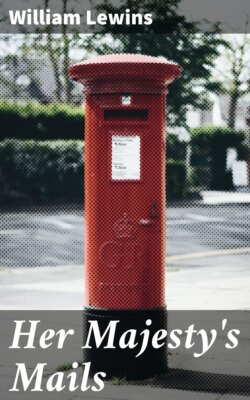Читать книгу Her Majesty's Mails - William Lewins - Страница 9
На сайте Литреса книга снята с продажи.
Footnote
ОглавлениеTable of Contents
[10] The special messenger who informed James of Queen Elizabeth's death accomplished a great feat in those days. Sir Robert Carey rode post, with sealed lips, from Richmond in Surrey to Edinburgh in less than three days.
[11] Notes and Queries, 1853.
[12] This instance, showing the usage, gives us an insight into the amount of control under which these public servants were held. Sir Cornelius was in the bad grace of the people of the district through which he had to pass, on account of being a foreigner; so at Royston Edward Whitehead refused to provide any horses, and on being told he should answer for his neglect, replied, "Tush! Do your worst. You shall have none of my horses, in spite of your teeth."—Smiles.
[13] Blackstone, in speaking of the monopoly in letter traffic, states that it is a "provision which is absolutely necessary, for nothing but an exclusive right can support an office of this sort; many rival independent offices would only serve to ruin one another."—Com. vol. i. p. 324.
[14] Journals of the House of Commons, 1644.
[15] Journals of the House of Commons, 21st March, 1649.
[16] In Burton's Diary of the Parliament of Cromwell, an account is given of the third reading of the new Act, which is important and interesting enough to be here partly quoted. "The bill being brought up for the last reading—
Sir Thomas Wroth said: 'This bill has bred much talk abroad since yesterday. The design is very good and specious; but I would have some few words added for general satisfaction: to know how the monies shall be disposed of; and that our letters should pass free as well in this Parliament as formerly.'
Lord Strickland said: 'When the report was made, it was told you that it (the Post-Office) would raise a revenue. It matters not what reports be abroad, nothing can more assist trade and commerce than this intercourse. Our letters pass better than in any part whatsoever. In France and Holland, and other parts, letters are often laid open to public view, as occasion is.'
Sir Christopher Pack was also of opinion, 'That the design of the bill is very good for trading and commerce; and it matters not what is said abroad about it. As to letters passing free for members, it is not worth putting in any act.'
Colonel Sydenham said: 'I move that it may be committed to be made but probationary; it being never a law before.'" The bill was referred to a Committee, and subsequently passed nearly unanimously.
[17] Lord Macaulay states that there was an exceptional clause in this act, to the effect, that "if a traveller had waited half an hour without being supplied, he might hire a horse wherever he could."—History of England, vol, i.
[18] Cobbett's Parliamentary History, vol. ix.
[19] Macaulay's History of England, vol. i. pp. 387-8.
[20] Under William and Mary, Docwray was allowed a pension, differently stated by different authorities, of 500l. and 200l. a year.
[21] Amongst the Post-Office pensions granted in subsequent reigns, Queen Anne gave one, in 1707, to the Duke of Marlborough and his heirs of 5,000l. The heirs of the Duke of Schomberg were paid by the Post-Office till 1856, when about 20,000l. were paid to redeem a fourth part of the pension, the burden of the remaining part being then transferred to the Consolidated Fund.
[22] Stowe's Survey of London.
[23] Stark's Picture of Edinburgh, p. 144.
[24] "Letters and Despatches relative to the taking of the Earl of Ormond, by O'More. A.D. 1600."
[25] In 1784, the line of Milford Haven packets was re-established, the rates of postage between London and Waterford to be the same as between London and Dublin, viâ Holyhead. The packets were, however, soon withdrawn.
